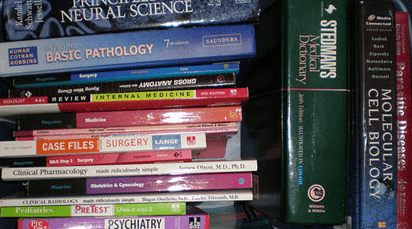One medical student tells us what it's really like to do a medicine degree.
4 UCAS chances, two or more years of living like a recluse with your head in the books and weeks of volunteering and placements that you had to work your arms off writing applications for…and now you’re finally here! Congratulations, you strapping young fresher, you’ve made it into medical school! Just like everyone else on your course, you’ll have started it with that same sense of ‘is this actually happening’ combined with the terrifying realisation that one day you’re actually going to be a responsible healthcare professional.
Being such an age-old degree, the stereotypes that come with medical students are well established and you won’t be able to bring up what subject you study without a few being injected forcefully into the conversation. Fear not, daunted fresher, for that does not mean to say that medical student life is as black and white as the jokes make it out to be…
First Year is easy
Talk to anyone on any degree and this is all you’ll get – year one is a farce. Sure, this is the one time to try everything, but whether you are somebody who has coasted through all previous years of academia, or dedicated every spare hour to grafting for grades, the ‘course you’ve been waiting for’ is going to hit you harder than any hangover.
It’s not so much that the work is hard, it’s everything that goes with it too. Lecturers, possibly focussed more on researchers, taking ages to reply to emails and teaching you a muggle of facts doesn't help. You’ll spend a lot of time wondering why what you’re learning appears to neither be interesting nor in the right order.
Once you’ve got that lecture in the bag, it's a job well done, but that doesn’t stop the next information overload from flying at you thick and fast. There’s always something to be done, and if it isn’t going over lectures then it's critical appraisals (the new synonym for ‘compulsory essay that we aren’t ever going to read after you stay awake writing it’). First-year content might be the least demanding, but it can be overwhelming learning how to piece together all the little aspects of the course that don’t seem to mesh. And whatever anybody tells you, don’t forget that, yes, your first year does count.

Above: In a 1st-year medicine lecture...
Fantastic support
One day you’re going to have human lives in your hands, so the department support for medics must be fantastic, right? Guess again. As mentioned previously, some lecturers may not have time for you because they’ve got jobs of their own, and curriculums are always being fiddled around with from previous years, making it difficult to know what’s what by asking the older years.
One thing the more mature students can tell you is that taking everything on the extensive reading list out of the library is a serious waste of time and room space – depending on where you study, big all-in-one textbooks are going to be your best friend. Live by the likes of Medical Sciences and Tortora. Keep your eyes peeled on Facebook events for anytime a second or third year hosts a revision session as those little slices of their time are golden gems.

Medics can get on with everybody
So you’ve gone through the whole interview process believing that, having been skilled enough to convince the interviewers to let you in, you have the ability to charm anybody. Not strictly true. The older years are going to dislike you. The dentists are going to dislike you. The vets are going to dislike you. Pretty much anybody else who has the gist of the stereotype that medics are cliquey and loud is going to dislike you. Get used to it.

Medics live with medics
Given that you spend so much time together, the picture of medics only associating with one another is quickly painted. It’s quite easy to see why when looking at the older years – most usual university courses are not five years long, so it’s inevitable that, by the end of it, your last friends standing will be future doctors. As a fresher in halls, the odds of you being randomly allocated a flat with course mates is unlikely and you’ll find yourself appreciating seeing the people who aren’t from your 9-5 world when you come back in an evening.
It all depends on how and who you choose to get involved with in your social time. Strangely, as much effort as you might put into seeing non-medics, you’ll always find yourself getting comfortable with fellow medics faster and you’ll be left confused when friends from other courses complain about the lack of acquaintances they know from lectures.

The Medsoc is a force to be reckoned with
Each medical school’s society is very different, but at the heart of each is the principle that medics need a collective ‘family’ to turn to for socials, charity events and everything else under the sun before their course burns them out. Many have national reputations or cause such a stir as to put them at odds with their own student union. Without even trying, you’ll find that you know at least several names and stories of the committee members and you’ll soon learn that they’re a force to be reckoned with.
If you choose to be a dedicated fresher and get as stuck in with it as you can, you’ll soon find yourself at the heart of a rowdy brethren of fantastic lunatics who you can’t believe are going to be healthcare practitioners one day. There is always the option of opening up your free time to less subject-specific societies, allowing the potential for a great array of memories with people from a broader walk of life but at the consequence of being out of the loop when it comes to the juicy gossip sharing from the last Medsoc social.

Medics never sleep
There’s this idea floating around that medics are permanently awake in town or the library before miraculously making it to 9 am classes. Sadly, the title of ‘medical student’ does not come with superhuman abilities. Fuelling yourself on caffeine and insanely high blood glucose levels can only take you so far before you inevitably hit the sack. You will find yourself going home for long weekends that see you refusing to leave your childhood bedroom, and cramming in power naps in those awkwardly timed lecture breaks.
There are so many extra things you can do as a medical student outside of studies and socialising that it can appear as though we spend every moment of our lives avoiding bed, but the fact is that if we aren’t spending most of our spare moments there then you can be pretty sure we slept through our last lecture.

You’re a doctor from day one
In spite of all the professionalism talks putting the fear of god in you against ever having a social media account or appearing in public, this doesn’t make you an instant professional. You’re going to find yourself in compromising but hilarious photos of nights out on Facebook whilst taking to Twitter and YikYak to moan about everyday life. Equally, the whole expectation of finally learning career-specific info is likely to fall a little short for the first few weeks. Cell biology and basic genetics are your new worst enemies, haunting you from the A Levels you thought you’d left very far behind.

Five years is a death sentence
A favourite retort of many is when you reveal what degree you study, it almost makes you question your sanity. Why would you choose to spend five years of your life studying when your non-medic friends are going to be rolling in the megabucks after three? But just take a quick Facebook stalk of any fifth-year contacts you make and you’ll soon realise that they’ve had an insane time. The lifelong friends they’ve made, the opportunities they’ve had and the memories they’ve made have made the wait worth it. One day, all going to plan, that’s going to be you!
Are you or someone you know a medical student? Join the Student Hut Community and get access to exclusive tips, tricks and even paid surveys for you to share your opinion.













